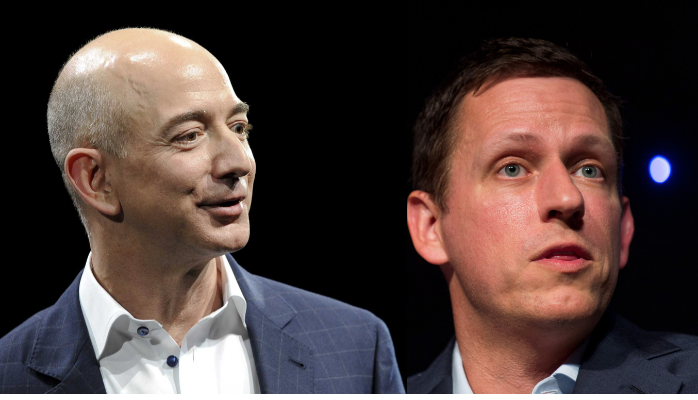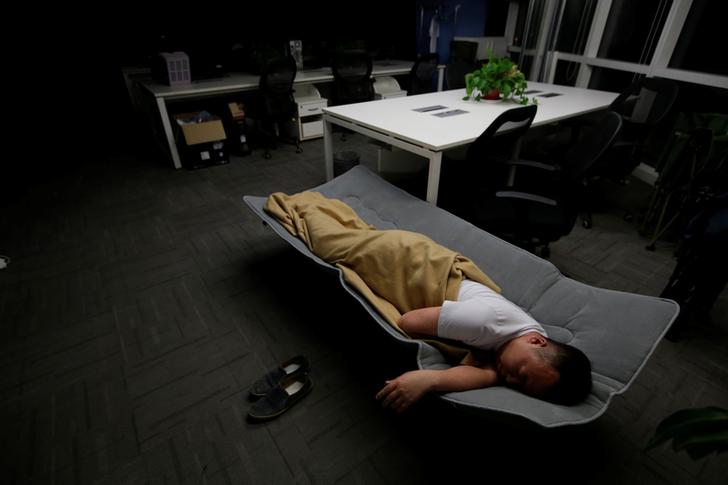Trump administration on a 'collision course' with silicon valley Later today, the titans behind the phone in your pocket and your driverless car (
coming soon!) will meet in Manhattan to do something that most of them considered unthinkable mere weeks ago: they'll ascend the golden escalator at Trump Tower and pay their respects to the president-elect.
Most, of course, being the operative word, since Silicon Valley's black sheep billionare, Peter Thiel, will also be in attendance, and long ago threw his MAGA hat into the ring for Donald Trump.
In a closed-door meeting that not even one of Jeff Bezos'
drones could get into, President-elect Trump will welcome CEOs from the likes of Tesla, Amazon, Facebook, Google, Apple, Oracle, and Microsoft for a roundtable meeting. There is no secret that the vast majority of Silicon Valley favored Hillary Clinton in the election, but it is not so clear as to how respectful, how deferential, and how productive the meeting will be.
Eurasia Live spoke with our geotechnology practice head
Paul Triolo to preview the summit and provide some much-needed context around the...well..strained relationship between Silicon Valley and President-elect Donald J. Trump.
EURASIA LIVE: What are the specific dynamics to watch for in the roundtable? Trump and Bezos? Thiel and every other tech titan who wrote him off for supporting Trump? What will you be watching for?
PAUL TRIOLO: Trump's transition team is keeping mum on the invitee list, but rumor has it that top execs from Tesla, Amazon, Facebook, Google, Apple, Oracle, Twitter, and Microsoft
will be there. It's not clear if Trump will fully participate or just make a cameo appearance. Son-in-law Jared Kushner and White House Chief of Staff Reince Preibus may do most of the talking on the President's side.
I would expect Trump and his staff to be in respectful listening mode, eager to hear the concerns of leading U.S. tech companies. The person to watch will be Peter Thiel, who has probably by now soaked up a little more of Trump's predilections in the high-tech policy arena and may try to serve as high tech Whisperer in Chief for Trump to try and help bridge the perception gap with the jittery high tech moguls. I don't expect Twitter chief Jack Dorsey to say much, though Trump will almost surely gush over the platform and how much use he gets out of it.
It's not even clear if Trump will fully participate or just make a cameo appearance.
Amazon's Jeff Bezos will have a hard time containing himself if Trump raises the issue of Amazon not paying state sales taxes (it is actually paying them now in some states), as he has said in public previously. I would also expect that the issue of fake news would come up, and this could be a particularly interesting part of the conversation, with Trump and staff likely downplaying the role fake news played during the election. The conversation could get awkward.

Amazon founder & Washington Post owner Jeff Bezos (L) is in many ways an ideological opposite to Paypal co-founder & Facebook board member Peter Thiel (R).
EL: What else will you be watching for?
PT: There should be a lively discussion of the H-1B program, which Trump during the campaign said was a ruse to swap highly-paid Americans for minimum-wage-or-less immigrants. It will be high on the priority list of Apple's Tim Cook, Facebook's Mark Zuckerberg, and Google's Sundar Pichai. The widely differing personalities of the tech leaders could create an interesting dynamic. While Cook tends to listen quietly, he can be prone to sharp comments, and the youthful Zuckerberg, who was three when The Art of the Deal came out, may have a hard time connecting to the President-elect.
All will also be keen to hear Trump's latest views on the encryption versus privacy issue, and his views on expanding U.S. surveillance programs. There are a number of issues which the Trump team may choose to play down in this meeting, such as Trump's calls for reducing corporate taxes and how this might impact issues such as high-tech companies not paying taxes in the U.S. and keeping profits overseas.
I would also expect that the issue of fake news would come up…it could get awkward.
EL: A founding principal of most tech companies is that disruption is a tool that improves the future for everyone. Trump, and many of his supporters, however, have pointed to such disruption (like manufacturing and automation) as a job killer. Is this dichotomy between Trump and Silicon Valley too fundamental to be resolved?
PT: The new U.S. administration appears to be set on a collision course of sorts with Silicon Valley, stoked by the President's populism, fueled by the forces of anti-globalization, and focused on a range of contentious technology issues. These range from a general sense that the new President's base overlaps substantially with workers whose jobs are being put at risk by automation, artificial intelligence, and other technologies championed by high tech companies, the perception that tech entrepreneurs are out of touch with the needs of middle America, and tech industry championing of trade deals that the new President has pledged to roll back. Indeed, some of the US campaign's primary themes, jobs, globalization, trade, and immigration, are all fundamentally linked to technological change.
The resulting risks of this potential clash center on the future of U.S. leadership of some cutting edge technologies and startups: the ramping up of conflict on one or more of the specific issues between the White House and the Valley could dampen the appeal of the US high-tech model, shifting some focus on innovation to places like the EU and China. A small number of observers view the collision between the Valley's high-tech globalized culture and the new President's populist movement as inevitable, and potentially so divisive that technologists should consider building an "opt-in society, outside the U.S., run by technology." However, Trump has made comments on both sides of many of the contentious technology issues where he could clash with Silicon Valley, and most will require congressional action and significant input from high tech companies.
The new U.S. administration appears to be set on a collision course of sorts with Silicon Valley
EL: On questions like the San Bernardino Apple controversy, is there any common ground between the tech sector and FBI?
PT: At present there is little common ground on this issue, due to the historical process that has been marked by industry fighting the placing of any restrictions on the development and use of encryption and applications employing strong end-to-end encryption. The policy debate over the increasing use of encryption and the need to maintain so-called “exceptional access” for law enforcement goes back to the late 1980s. Encryption has now become a vital tool that makes possible modern communications, from protecting information from being monitored by intelligence services or criminals, to verifying on the online identities of those exchanging information, to ensuring that the data exchanged has not been altered.

People gather at a small rally in support of Apple's refusal to help the FBI access the cell phone of a gunman involved in the killings of 14 people in San Bernardino, in Santa Monica, California, United States, February 23, 2016.
The initial policy debate only addressed the issue of ensuring access to communications, and never resolved the issue of whether legislation was necessary to mandate exceptional access, for example, through back doors in encryption. In the intervening period, U.S. companies have advocated a policy of encryption-exceptionalism, and this has meant that there was no attention paid to developing technologies and approaches in the area between “end-to-end encrypt everything” and exceptional access. In the meantime, other countries such as China, Russia, Brazil, the UK, Canada, and France are considering or have begun implementing legislation attempts to mandate exceptional access for law enforcement purposes.
EL: What else will you be watching for?
PT: There seems to be little chance in the near-term that, by themselves, policies pursued by Trump could result in major innovation hubs being established in the rust-belt. Innovative hubs/cities require a complex mix of factors to come together, including a critical mass of the right type of innovative people, desirable places to live, the proximity of institutes of higher learning, government R&D facilities, and increasingly, easy access to overseas high-tech personnel from China, India, and southeast Asia, etc.
Some potential Trump tech policies, such as a major change in the H-1B visa program, would work against this. It is possible that Trump's tech policies could help in some of these areas, but the establishment and development of major innovation hubs like Silicon Valley and Route 28 tend to be driven by the ready availability of a number of the key factors noted above, coupled with good timing and sustained innovation and investment.
EL: Is there a risk that fights between Trump and Silicon Valley can put the U.S. at a disadvantage relative to other powers active in cyberspace?
PT: The risk of a major rupture with Silicon Valley in the near term is low, but other clashes more likely to occur in 2017 could impact the trajectory of global innovation. For example, pursuit of non-tech company-friendly changes to a key high tech worker visa program and anti-immigrant rhetoric could over time blunt the appeal of the U.S. in general, pushing away the skilled immigrants and innovators that have made the Silicon Valley the global hub of the high-technology economy.

Ma Zhenguo, a system engineer at RenRen Credit Management Co., sleeps on a camp bed at the office after finishing work early morning, in Beijing, China, April 27, 2016.
Other countries, in particular China and Canada, are already trying to take advantage of the perception that we will see more restrictive Trump visa policies to try and lure away IT professionals. Finally, there is a worst case risk that the Trump administration pursues policies that hasten the balkanization of the Internet, as trade agreements seeking to prohibit data localization are halted or renegotiated, fears of new U.S. surveillance efforts undermine cross border data flow agreements carefully negotiated with the EU, and fears of back doors in U.S.-produced smartphones and other Internet devices create new trade barriers such as more onerous cybersecurity reviews.
EL: Given Trump's vows to “knock the hell out of ISIS” will he work more closely with Silicon Valley to win the war on the cyber/social battlefield?
Yes, there is a lot of momentum already behind having high tech companies in the Valley and elsewhere help in attacking the social media/cyber elements of extremism. Already Silicon Valley firms are engaged in dialogues on how to combat extremism online.
There is a lot of momentum behind having high tech companies in the Valley help in attacking the social media/cyber elements of extremism.
Google, Facebook, and Microsoft, for example, are working together on a new information sharing initiative to detect and remove extremist content from their respective platforms. They plan to create a database that will be shared among the companies that will consist of unique identifiers or digital footprints tied to terrorist recruitment videos, violent memes, or other imagery and data.
This will allow all of the shared database users to remove content identified by one of the partners. In addition, a United Nations Counterterrorism Directorate initiative has brought together leading Silicon Valley firms including Google, Microsoft, Facebook, Twitter, and the Russian cybersecurity firm Kaspersky as part of a public private partnership to address violent extremism online.




